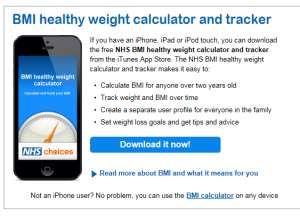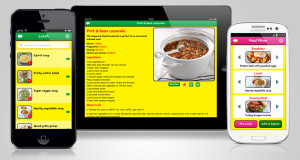Sexual Health screening
Confidential chlamydia screening for 16-24 year olds.
Enquire at reception.
Obesity Clinic
We are now running a Obesity Clinic which is available at the surgery.
We can offer:
- Weight and lifestyle advice
- 8 week weight loss plan where you can get weighed weekly by our Practice Nurse
If you are motivated and want to enrol in this service, please make an appointment to come and see our Practice Nurse.
Here are a few links that you may find useful.
If you want to have an app for your mobile phone, there a few that you can download all free of charge from the App Store – if you have an Iphone or Play Store – if you have an Android.
NHS CHOICES BMI CALCULATOR
CHANGE FOR LIFE APP
Family Planning
Advice on all types of contraception including giving of contraceptive injections.
Please contact reception to book an appointment with Our family planning Nurse Marian. Dr Kumana and other doctors are always available to give advice or see complex cases.
Six week baby and postnatal checks
Six week baby check up clinic is conducted by Dr Kumana or Dr Ali.
Wednesday 2.30pm – 4pm
Vaccinations
Routine and travel vaccinations for all ages are available during surgery times by appointment with our nurses.
Routine Vaccinations for all children up to age 5.
Routine Vaccinations for people over the age of 65.
We run a flu vaccine clinic in October.
Variable. Call Reception
Asthma
Asthma is a condition that affects the smaller airways (bronchioles) of the lungs. From time to time the airways constrict (narrow) in people who have asthma. This causes the typical symptoms. The extent of the narrowing, and how long each episode lasts, can vary greatly.
Asthma can start at any age, but it most commonly starts in childhood. At least 1 in 10 children, and 1 in 20 adults, have asthma. Asthma runs in some families, but many people with asthma have no other family members affected.
What are the symptoms of untreated asthma?
The common symptoms are cough and wheeze. You may also become breathless, and develop a feeling of chest tightness. Symptoms can range from mild to severe between different people, and at different times in the same person. Each episode of symptoms may last just an hour or so, or persist for days or weeks unless treated.
External Links
The following factsheets available from Patient UK gives information and advice on a variety of asthma related topics:
Management of Childhood Asthma
Medicines inside inhalers; types of inhaler devices
Asthma UK – the charity dedicated to improving the health and well-being of people in the UK whose lives are affected by asthma.
What care you should receive from the practice – The Team
Our practice nurses have specialist asthma qualifications. They run clinics in order for asthma to be assessed, advice offered, queries answered and correct treatment ensured.
Patients on asthma medication should be seen at least once a year in the asthma clinic for a check up with the nurse.
Chronic Obstructive Pulmonary Disease (COPD)
COPD permanently damages your airways. While there is no cure, treatments are available that can slow down this progressive disease and improve the quality of life of people with the condition. The disease is most common in smokers – whether you’re a current smoker or quit years ago and are healthy.
External Links
You can find out more by following the links below:
Diagnosis of COPD
Diagnosis is confirmed by having a spirometry test.
What is a spirometry test?
Spirometry is the most common of the lung function tests. These tests look at how well your lungs work. Spirometry shows how well you breathe in and out.
If we are concerned we will invite you in to the surgery to have a Spirometry Test done by one of our COPD trained nurses. We run clinics for patients with COPD to be assessed, advice offered, queries answered and correct treatment ensured.
Diabetes
Diabetes occurs when the level of glucose (sugar) in the blood becomes too high. Normally, after we eat, various foods are broken down in the gut into sugars which are then absorbed into the body. The main sugar is called glucose. To remain healthy, your blood glucose level should not go too high or too low. A hormone called insulin helps to take glucose from the bloodstream into various cells of the body. This helps to keep the blood sugar normal.
Insulin is made by special cells in the pancreas. In Type 2 diabetes, the commonest form, you either: do not make enough insulin for your body`s needs, and/or the cells in your body are not able to use the insulin properly. .) Type 2 diabetes usually first develops after the age of 40. It tends to run in families. It is more common in people who are overweight. It is also more common in African, Afro-Caribbean and Asian people.
What are the symptoms of Type 2 diabetes?
Symptoms tend to develop quite slowly, over weeks or months. They include: excess thirst, passing large amounts of urine, tiredness, weight loss, and feeling generally unwell.
External Links
What care you should receive from the practice – The Team
We are part of the Year of Care Diabetes Project we aim to offer an exemplary service to our patients around their Diabetic care.
What is Year of Care?
Year of Care is based on introducing a care planning approach. It involves people with diabetes working with those delivering their care to make joint decisions and agree how their diabetes will be managed. This creates an opportunity for you to feel more in control of your diabetes.
So what does it mean for you?
Before your appointment:
You will be asked to attend the surgery about two weeks before your yearly diabetes appointment to have all your checks done. This will be with our Practice Nurse.
These results will be sent to you before your yearly diabetes appointment. This will give you the chance to be able to think about what the results mean to you and what you might want to discuss. The results are in a traffic light system format Green, Amber, Red this is explained in the letter.
At your yearly appointment:
You will be seen by our Physician Assistant Pauline Boland who has a special interest in Diabetes and is the practice lead for this condition. You will be able to discuss your results and talk about what is important to you. You will both have an opportunity to raise concerns, talk about risks and explore what options may be available for you to help to manage and cope with your diabetes.
By the end of your appointment you will have a plan that has been agreed jointly this is called your Care or Action Plan.
Recommended Tests for Diabetic Patients
Examination
- Smoking status, and all patients who smoke to be advised to stop.
- Weight and BMI checked
- Foot check including an assessment of foot pulses and sensation
- Eye test by approved tester, currently the Homerton hospital.
- Blood pressure, aiming for a level of 145/85 or less
Blood tests
- HBA1c to assess diabetic control. Aiming for a level of 7.4 or less.
- Cholesterol level, aiming for a level of 5 or less.
- Serum creatinine as a measure of kidney function
Urine Tests
Microalbumin ratio as a measure of kidney function
Vaccination
All patients should have the flu jab in autumn
Hypertension / High Blood Pressure
Blood pressure is the pressure of blood in your arteries. Blood pressure is measured in millimetres of mercury (mm Hg). Your blood pressure is recorded as two figures. For example, 150/95 mm Hg. This is said as 150 over 95.
- The top (first) number is the systolic pressure. This is the pressure in the arteries when the heart contracts.
- The bottom (second) number is the diastolic pressure. This is the pressure in the arteries when the heart rests between each heartbeat.
High blood pressure is a blood pressure that is 140/90 mm Hg or above each time it is taken at the GP surgery (or home or ambulatory readings always more than 135/85 mm Hg). That is, it is sustained at this level. High blood pressure can be:
- Just a high systolic pressure – for example, 170/70 mm Hg.
- Just a high diastolic pressure – for example, 120/104 mm Hg.
- Or both – for example, 170/110 mm Hg.
However, it is not quite as simple as this. Depending on various factors, the level at which blood pressure is considered high enough to be treated with medication can vary from person to person.
Your chances of having high blood pressure increase as you get older. There is often no clear cause of high blood pressure but you are at increased risk if you:
- are overweight
- have a relative with high blood pressure
- are of African or Caribbean descent
- eat a lot of salt
- don’t eat many fruit and vegetables
- don’t do enough exercise
- drink a lot of coffee (or other caffeine-based drinks)
- drink a lot of alcohol are aged over 65
External Links
www.bpassoc.org.uk Blood Pressure Association
www.hbpf.org.uk High Blood Pressure Foundation
How can blood pressure be lowered?
There are two ways in which blood pressure can be lowered:
- Modifications to lifestyle (weight, exercise, diet, salt, caffeine and alcohol), if any of these can be improved upon
- Medication
What care you should receive from the practice
It is vital that you have regular blood pressure checks as well as cholesterol checks. Our practice nurses can help assess, provide advice, answer queries and provide the correct treatment to help patients with hypertension.


